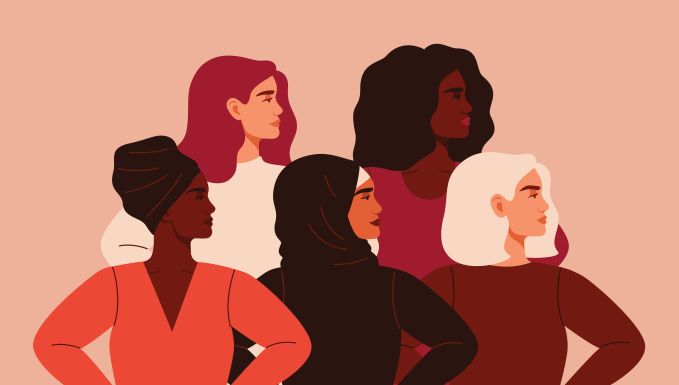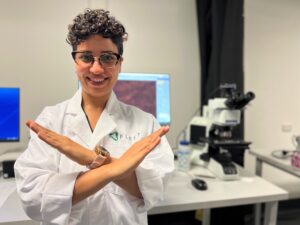Maedehsadat (Maede) Mousavi is a FLEET PhD student in chemical engineering and material science at the University of New South Wales. Her research investigates the synthesis and application of liquid metals and topological insulators, which are a new class of materials that are insulators on their interior, but will conduct electrical current on their edges without the loss of energy. The research team she is a part of aims to create new technologies and materials that can improve the efficiencies of the electronic and optical-based systems that can impact people’s health and wellbeing.
Maede is blazing a trail not just for women in STEM, but for women growing up in a similar cultural background to her own.
When asked, what does break the bias mean for you, Maede said, “I will start with a remark from Tian Wei, a Chinese news anchor and World Economic Forum Young Global Leader
“Any society that fails to harness the energy and creativity of its women is at a huge disadvantage in the modern world.” (Tian Wei)
“I come from Iran, a male-dominated society, which has meant that I’ve spent my whole life battling to achieve my dreams. In my country, some parents, including mine, do not allow females to make autonomous decisions about their life or job in society, particularly in male-dominated environments such as the engineering industry.
“I worked hard to study chemical engineering. Despite the difficulties I had going abroad to continue my scientific adventure, I came to Australia and proved to myself and other people that I could be successful and live on my own without the support of my family. Migration is a challenging process that was harder for me because I had to deal with disagreements with my family including whether I could live alone as a woman. I have proved them wrong and today I’m a second-year PhD student in chemical engineering with UNSW and FLEET and building a solid résumé. I made it. I hope that other women in similar situations anywhere in the world will also pursue their aspirations, and know there is a place for them in any career they choose and that they too can make a difference.”
“I still have a long way to go, and every morning I remind myself that success is not something that I dream about; it is something that I strive towards. There are many hurdles ahead of me, especially as a woman. I’ve been petrified at every turn of my life, but I’ve never allowed that to stop me from doing whatever I set my heart on.”
Maede was recently one of four FLEET women awarded a scholarship enabling participation in the 2022 Leading Edge program offered by Women and Leadership Australia, part of a national initiative encouraging more women in leadership across key industries. They are highly competitive, with a limited number of applicants from each organisation eligible to apply.
“As a woman eager to continue her career in academia, Leading Edge will help improve my leadership potential to manage my students as a team in the future, benefitting my postdoc and future employment,” says Maede.
Maedehsadat Mousavi, FLEET PhD student in chemical engineering and material science at the University of New South Wales.Striking the Pose #BreakTheBias
Maede’s research
Maede is based at UNSW’s Centre for Advanced Solid and Liquid based Electronics and Optics (CASLEO), School of Chemical Engineering.
Part of Maede’s research is with liquid metals, which are metals that are liquid at room temperature (or a bit below), for example gallium and its alloys. Such metals are attractive materials because of their unique electrical, thermal and fluidic properties.
In a study published late in 2021, Maede and her research team showed that liquid metals can offer their characteristics to the pharmaceutical and chemical industries, with the possible elimination of moving parts in continuous flow reactors providing improved performance and reduced maintenance costs. Liquid-metal machines in this context could wipe out maintenance issues for continuous flow reactors used in industry.
In only the second year of her research career as a PhD candidate, Maede has already co-authored 10 peer-reviewed publications.
Check the four other FLEET women profiled for International Women’s Day
Meera Parish; Patjaree Aukarasereenont; Peggy Schoenherr; Golrokh Akhgar
Back to International Women’s Day: FLEET women blazing their own trail


